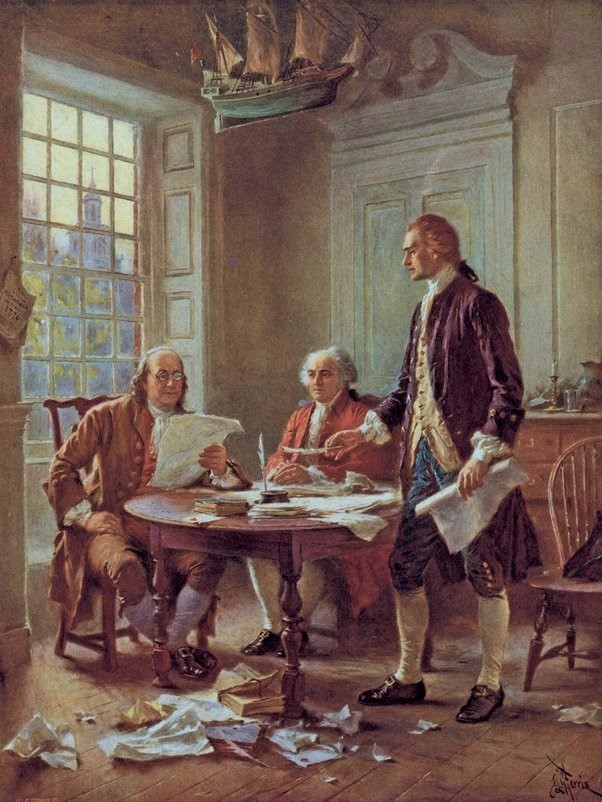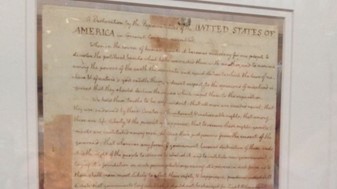
Insights to Declaration
Mike Kapic – July 4, 2023
Here are two astute studies on understanding the first steps in our founding.
Six Principles by David Barton (Lesson 7 of Rick Green’s Patriot Academy: Biblical Citizenship)
- There is a Divine Creator. All men are endowed by their Creator. Government is not at the top of the pecking order which is the ‘limiting’ factor. There is not a ‘secular’ government in the world that is ‘limited.’
- Inalienable rights come from God, not government. In America, parents are responsible for children’s education. (Germany: homeschooling is illegal. Scotland: every child is assigned a government official liaison.
- Purpose of government is to protect inalienable rights.
- The Creator has established a fixed moral law (“the laws of nature & of nature’s God”)
- The consent of the governed or will of the majority. To secure these rights, governments are instituted among men & derive their power from the consent of the governed. (nothing smaller than a majority gets to decide a vote)(consent means over that which the government controls: the width of the sidewalk or speed limit, but not rape, murder, self-defense, speech)(government is to protect inalienable rights & not write any laws regulating them)
- The people’s right to change their government. If any one of the previous five principles are abridged by government, then it is the right of the people to change their government.
***

The Original Version of the Declaration of Independence
By Erin McCarthy – July 4, 2014
In 1776, the Continental Congress ratified the Declaration of Independence. But the document you know and can probably recite from memory (at least partially) is much different from what Thomas Jefferson—the primary author in a committee of five men commissioned to draft the document—originally wrote.
Jefferson submitted the “rough draught” of the Declaration of Independence to the Second Continental Congress on June 28, 1776. Delegates argued the details of the document for two days before making a number of changes to it—and Jefferson was not pleased. In the days after the document was ratified, the founding father handwrote several copies of his original version, underlining what had been changed, and sent them off to several friends.
Most of the changes were made to the last half of the document; notably, the following passage, which referred to slavery, was omitted to appease delegates from Georgia and South Carolina. Of the King, Jefferson wrote (bold indicates an underlined portion):
he has waged cruel war against human nature itself, violating its most sacred rights of life & liberty in the persons of a distant people, who never offended him, captivating & carrying them into slavery in another hemisphere, or to incur miserable death in their transportation thither. this piratical warfare, the opprobrium of infidel powers, is the warfare of the Christian king of Great Britain. determined to keep open a market where MEN should be bought & sold, he has prostituted his negative for suppressing every legislative attempt to prohibit or to restrain this execrable commerce: and that this assemblage of horrors might want no fact of distinguished dye, he is now exciting those very people to rise in arms among us, and to purchase that liberty of which he has deprived them by murdering the people upon whom he also obtruded them; thus paying off former crimes committed against the liberties of one people, with crimes which he urges them to commit against the lives of another.
Also omitted was this rallying cry (again, emphasis Jefferson’s):
we might have been a free & a great people together; but a communication of grandeur and of freedom, it seems, is below their dignity. be it so, since they will have it: the road to happiness and to glory is open to us too; we will climb it apart from them, and acquiesce in the necessity which denounces our eternal separation!
Today, only two complete copies of the document (and one fragment) remain intact. Each year before the fourth of July, the New York Public Library puts its copy (from which this text is taken) on display; you can see one of the photos from when we checked it out above, and get a closer look at it yourself here.
The Library can trace the ownership of its “Autograph Manuscript” to Cassius F. Lee of Alexandria, Virginia. It may have been the copy that Jefferson sent to George Wythe, his former law professor and a mentor, though it’s never been proven.
